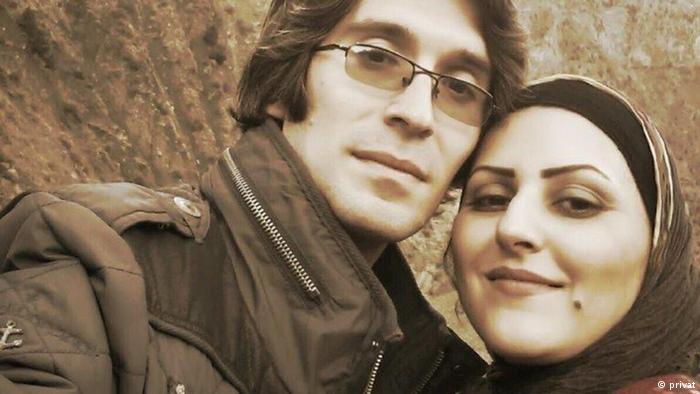Hunger strike made him popular. Domestic and foreign media talked about Arash Sadeqi and the 19-year prison term he has been sentenced to by Iran’s Judiciary.
His wife Golrokh Iraee was also the subject of popular demands in major campaigns launched for Sadeqi in Iranian social media. She has been sentenced to 6 years in prison, and this made the case of this “convicted couple” more romantic and emotional.
Many social media users throughout the world were influenced by the storm started in the cyberspace and various social media, particularly Twitter, with thousands of hashtags posted in support for Arash.
Iranian politicians as well as a number of lawmakers joined the wave and said in their posts that “the life of a human being is in danger, and something should be done to end a more than two-month hunger strike.”
In such an emotional and tense situation, where the ‘human life’ is in danger, few celebrities and even less-known social activists can swim against the tide. Possibly because of the same reason, many celebrities and social media users keep silent and refuse to make any comment for or against the issue. No one wants to be accused of supporting violence and be declared by others as apostate for defending what deems to be right.
Usually, under the circumstances we see these days, two options seem to be more logical and closer to expediency: First, joining the campaign and movement and swimming with the tide, and second, keeping silent!
Therefore, at least in Iran, some people have dared to voice their comments. Knowing about these people’s opinions, whose number is not at all small if we take into account their silent like-minded fellows, would help us better understand the truth.
Foreign observers of Iran’s affairs have always been surprised because of their failure to know about the hidden layers of Iran’s society, the numerous people who have poured to streets after different events and on various occasions.
Texts like the following one indicate the other side of Arash’s coin. By looking from a different view and angle, the deeper parts of Iran’s modern society can be understood to some extent. They are important parts of the Islamic Revolution’s social assets and the ruling system that has come out of it. Therefore, a hasty observation of cyberspace cannot help foreigners realize their weight and power. However, they usually leave some traces in social media, which can be analyzed.
Here is IFP’s translation of excerpts from a post by Maryam Falahatzadeh in her Telegram channel, who believes hunger strike is a tactic to show that you are innocent and a move to create waves against the truth:
Judge it for yourself; please stop being prejudiced and get out of the world of hashtags and media fuss: A person who has had close links with PJAK armed militants, has showed sympathy with the enemies of Iranian nation (the MKO terrorist group), and has made every effort against Iran’s national security in the chaotic region of Middle East, is now considered the innocent one in Twitter and Instagram these days!
Even if we forgive thousands of their unforgivable crimes, the verdict is the result of legal procedures: in this case, the defendant has had access to a lawyer, the case has been investigated at the Court of Appeals, and has been upheld by Iran’s Supreme Court. This is the procedure all other Iranian people go through and receive their sentences.
The establishment of peace and security is impossible without the rule of law and people’s adherence.
It is interesting that a man has spent 68 days without eating anything, and still he is alive! Honestly, use more logical lies if you want to pretend you are innocent!
Have those who claim to be advocates of humanity ever talked about thousands of homeless people in this country?!
Do they know about such champions as Ahmad Motevaselian [Iranian military attaché who disappeared in Lebanon in 1982]? At least post hashtags in support for honourable people who have sacrificed their lives for their homeland, and the security we have today is because of their efforts.
Oh God! How is it possible that people who have never read about Arash Sadeqi’s life and whose only source is Wikipedia defend a traitor for a number of likes?
Have you forgotten the cases of Ahmad Batebi and Shabnam Madadzadeh? These were the ones for whom some people posted hashtags, but finally ended up in the MKO terrorist group after a while!

